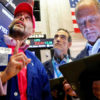
Stocks end lower as market retreats from records on renewed coronavirus fears
Stock indexes closed lower Thursday despite hitting fresh intraday highs after a change in the methodology used by China resulted in a sharp rise in COVID-19 cases and deaths.
What did major indexes do?
The Dow Jones Industrial Average DJIA, -0.43% closed down 128.11 points, or 0.4%, at 29,423.3, while the S&P 500 index SPX, -0.16% lost 5.51 points, or 0.2%, to close at 3,373.94, after establishing an intraday record at 3,385.09. The Nasdaq Composite Index COMP, -0.14% closed 13.99 points, or 0.1% lower, at 9,711.97, after hitting its own intraday record in afternoon dealings at 9,748.32.
Those ending levels still marked the second highest closes on record for all three benchmarks, following each posting record finishes on Wednesday.
What drove the market?
China on Thursday reported 254 new deaths from the virus over the past 24 hours, while the number of new cases jumped 15,152, after the government applied a new diagnostic method in hard-hit Hubei province. The World Health Organization said Thursday that the total deaths from the outbreak stood at 1,369, while the total number of confirmed cases rose to 60,329.
Seema Shah, chief strategist at Principal Global Investors, said that the market may have exhibited a knee-jerk response to fresh reports on the outbreak. “The surge in reported cases reported today is a one-off change due to methodology and by itself, doesn’t imply an acceleration in the pace of infection,” she said in emailed comments.
“However, if the change in methodology does result in a rise in the growth rate of reported cases, market sentiment will inevitably deteriorate, reversing the more upbeat tone of recent days as markets had become increasingly reassured that the virus will soon plateau,” she said.
Meanwhile, in economic news, January consumer prices rose by a modest 0.1%, but ticked 0.2% higher once the figures were stripped out for food and energy prices. U.S. initial jobless claims for the week ending in Feb. 8 edged up 2,000 to 205,000, underlining the strength of the labor market.
On Capitol Hill, a pair of President Donald Trump’s nominees to the Federal Reserve Board of Governors — Judith Shelton and Christopher Waller — faced scrutiny from the Senate Banking Committee.
See: Democrats open campaign to defeat Trump Fed nominee Shelton
Which companies were in focus?
- Cisco Systems Inc. shares CSCO, -5.23% close down more than 5% after it reported second-quarter profit and revenue late Wednesday that came in slightly above Wall Street forecasts.
- PepsiCo Inc. PEP, +0.27% reported a sharp fall in fourth-quarter earnings and revenue that topped expectations, while raising its dividend by 7%.
- MGM Resorts International MGM, -5.53% shares closed 5.5% lower after the hotel and casino operator announced late Wednesday that Chief Executive Jim Murren will step down when his contract expires. The company also reported fourth-quarter results that disappointed on earnings.
- Shares of Bloom Energy Corp. BE, -7.74% ended 7.7% lower after the company announced late Wednesday that it would restate more than three years of financial statements due to miscalculations.
- Tesla Inc. shares TSLA, +4.78% slid after the electric vehicle maker on Thursday said it is planning to offer about $2 billion of common stock in an underwritten deal, but closed nearly 5% higher.
- Southwest Airlines Co. LUV, +0.10% said Thursday it will extend the time Boeing Co.’s BA, -0.75% 737 MAX planes are removed from flight schedules to Aug. 10 from June 6.
- Shares of Revolution Medicines Inc. RVMD, +70.00% roared 70% higher after its trading debut.
- Chesapeake Energy Corp. CHK, -2.80% shares slid below the 50-cent mark Thursday for the first time in 26 years after an international energy agency cut its forecast for oil demand to the lowest level since 2011. Chesapeake shares have lost more than 80% over the past 12 months.
- Shares of Ryder System Inc. R, -10.32% fell more than 10% after reporting a surprise Q4 loss and guiding lower.
- .Wayfair Inc. W, -14.13% stock slid more than 14% after the e-commerce home-design retailer said in a statement that it has cut about 3% of its global workforce.
- Aurora Cannabis Inc. shares ACB, +0.68% rose after the cannabis company posted a $981 million loss.
What did other markets do?
Oil prices erased early losses to settle higher. The price of a barrel of West Texas Intermediate crude for March delivery CLH20, +0.78% rose 25 cents, or 0.5%, to $51.42 a barrel on the New York Mercantile Exchange.
In precious metals, gold for April delivery GCJ20, +0.51% rose 0.5% to settle at $1,578.80 an ounce on Comex.
The U.S. dollar DXY, +0.05% was virtually unchanged relative to a basket of a half-dozen currency rivals.
U.S. government bond prices rallied, pushing yields lower, with the benchmark 10-year note rate TMUBMUSD10Y, -0.30% down 1.3 basis points at 1.61%. Bond prices rise as yields fall.
In Europe, the Stoxx Europe 600 SXXP, -0.02% shed less than 0.1% to end at 431.08. The FTSE 100 FTSE, -0.95% finished 1.1% lower at 7,452.03.
In Asia overnight, the China CSI 300 000300, -0.62% fell 0.6%, the Shanghai Composite SHCOMP, -0.71% declined 0.7%, and the Hang Seng Index HSI, -0.34% closed 0.3% lower. Japan’s NIKKEI 225 Index NIK, -0.14% slipped 0.1%.
—William Watts contributed to this report.

















